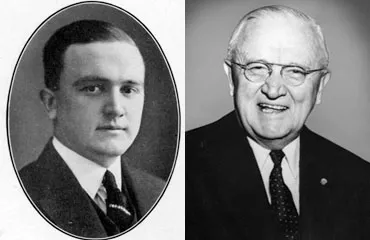About Thomas McCabe '15

When Thomas McCabe died in 1982, his mark on the world remained indelible, particularly at Swarthmore. In addition to the McCabe Achievement Awards Scholarship Fund he had established in 1952, his many tangible contributions included the Scott Amphitheater and the Thomas B. and Jeanette L. McCabe Library.
McCabe was a former chairman and CEO of Scott Paper Co. Under his leadership, Scott grew from a one-plant operation in Chester, Pa., to a network of mills throughout the nation and interests in more than 20 other countries.
McCabe held several important government offices, including that of chairman of the board of governors of the Federal Reserve System. He was a public governor of the New York Stock Exchange and chairman and a founding trustee of the Committee for Economic Development. In 1946, President Harry S. Truman bestowed on him the Medal of Merit for his contributions to business, education, and government. He held honorary doctoral degrees from 15 colleges and universities, including Swarthmore College and the Universities of Maryland and Delaware.
He was a director of General Electric Co., Campbell Soup Co., Scott Paper Co., and the Peninsula General Hospital in Salisbury, Md. He also was honorary chairman of the Marketing Science Institute and the Eisenhower Exchange Fellowships. In 1980, Mr. McCabe received the Ernest T. Stewart Award for Alumni Service from the Council for the Advancement and Support of Education.
On his death, the College's Board of Managers adopted a minute "in loving memory" of the 88-year-old emeritus member. It said in part: "Thomas Bayard McCabe seemed to have found the extraordinary fountain of youth. Throughout his life, he maintained a vision of understanding of young people. He not only accepted with grace the many tumultuous changes that occurred over his lifetime - he became part of them. Tom McCabe had a passionate belief in young people, and whether or not he agreed with their points of view, he was unfailingly tolerant and supportive.
"He was a rare man who gave not only of his substance but also unstintingly of himself. He was not content to participate in doing good at a distance; he involved his heart and his presence."



